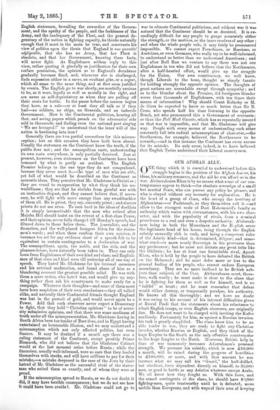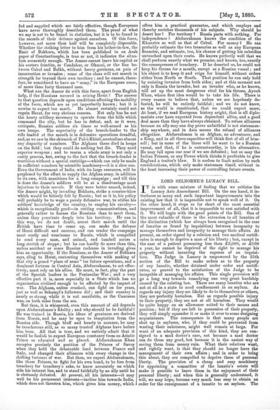OUR AFGHAN ALLY.
ONE thing which it is essential to understand before this struggle begins is the position of the Afghan Ameer, his ideas, his military resources, and the aid he can afford Us in the war. Abdurrah man Khan is by no means what some of our contemporaries appear to think—the absolute sovereign of a small but martial State, who can pursue any policy he please., and who is obeyed without any necessity for explanation. Ile is the head of a group of clans, who occupy the territory of Afghanistan—or Pushtaneh, as they them.elves c ill it —and allow to the strongest male of Dost Mahommed's family an authority which varies with circumstances, with his own character, and with the popularity of rivals, from a nominal precedence to a real and even a despotic authority. Ahdurrahman being in both the Mussulman and the Eeglish sense the legitimate head of his house, being through the English subsidy unusually rich in cash, and being a competent ruler of the Asiatic kind—that is, determined, diligent, and somewhat cruel—is more nearly Sovereign in his provinces than any predecessor ; but he must not irritate any great tribe like the Ghilzais ; he has at least one formidable rival, Ayoub Khan, who is held by the people to have defeated the British on the Helmund ; and he must defer more or less to the general feeling of his people, who cannot endure European ascendancy. They are no more inclined to be British subjects than subjects of the Czar. Abdurrabman mast, therefore, walk warily ; he must make it clear to the clans that he is fighting for them as well as for himself, and is no " infidel " at heart ; and he must remember that defeat would either destroy, or temporarily paralyse, his authority. He knows all this thoroughly ; and we have no doubt it was owing to his account of his internal difficulties given at Rawul Pindi that the statements about his reluctance to admit English troops, or even English observers, are originally due. He does not want to be charged with inviting the Kafirs needlessly. Fortunately for him, as against a Russian invasion his task is greatly simplified. The clans know him to be an able leader in war, they are ready to fight any Christi4n invader, whether Russian or English, and they think of the huge Empire to the South as the only effective counterpoise to the huge Empire to the North. Moreover, British help in time of war immensely increases Adurrahman's personal strength. We presume his subsidy, which is now X10,000 a month, will be raised during the progress of hostilities to £100,000, or more, and with that amount he can increase what we may call his "Guard," the half-drilled, but obedient, force dependent directly on himself, to 30,000 men, as good in battle as any Asiatics whatever except Arabs. We all know how they fought us. With this force, and the armed contingents of the clans, he should have 83,000 fighting-men, quite trustworthy until he is defeated, more mobile than Europeans, and with ways of their own of keeping fed and supplied which are fairly effective, though Europeans have never thoroughly described them. The proof of what we say is not to be found in statistics, but it is to be found in the records of their defence against ourselves. Of this force, however, not more than half will be completely disposable.
Whether the striking letter to him from his father-in-law, the Emir of Bokhara, which has been published in an Arab paper of Constantinople, is true or not, it indicates the situa tion accurately enough. The Ameer cannot leave his capital or his eastern frontier, or Candahar, or Ghuzni, or the line between Cabul and Balkh, without heavy garrisons, on pain of insurrection or invasion ; some of the clans will not march in strength far beyond their own territory ; and he cannot, therefore, be considered to have an "army," in the European sense, of more than forty thousand men.
What can the Ameer do with this force, apart from English help, if the Russians succeed in seizing Herat ? The answer to that question depends upon conditions affecting the mobility of the force, which are as yet imperfectly known ; but it is unwise to expect too much. He almost certainly could not regain Herat, for very obvious reasons. Not only has he not the heavy artillery necessary to operate from the hills which command the city, but he has to defeat, and, as it were, extirpate, Russian soldiers six times as well-armed as his own troops. The superiority of the breech-loader to the rifle loaded at the mouth is in defensive operations dreadful, and, as we saw in the skirmish of Pul-i-Khisti,neutralises almost any disparity of numbers. The Afghans there died in heaps on the field ; but they could do nothing but die. They need superior weapons ; and to rearm a whole army is not only a costly process, but, owing to the fact that the breech-loader is worthless without a special cartridge—which can only be made in sufficient numbers by scientific machinery—it is a slow one. Even the Government of India, with its large resources, will be perplexed by the effort to supply the Afghan army, in addition to its own, with munitions for a long campaign ; and till this is done the Ameer's soldiers will be at a disadvantage most injurious to their morale. If they were better armed, indeed, the Ameer might, by invading Bokhara, strike a counter-blow which would be bitterly felt by Russia ; but as it is, his policy will probably be to wage a purely defensive war, to utilise his soldiers' knowledge of the country, to employ his cavalry— which is exceptionally good—in cutting communications, and generally rather to harass the Russians than to meet them, unless they penetrate deeply into his territory. He can in this way, we do not doubt, arrest their march until the British have time to come up, can make the defence of Herat difficult and onerous, and can render the campaign most costly and wearisome to Russia, which is compelled to send every man, and animal, and tumbril across a long stretch of steppe ; but he can hardly do more than this, unless accident or some Russian rashness in invading gives him an opportunity. If the Russians, as the Ameer of Bokhara says, cling to Herat, contenting themselves with making of that city a grand "place of arms" for future operations, and a dominant fortress in Central Asia, Abdurrahman, to act effectively, must rely on his allies. He must, in fact, play the part of the Spanish leaders in the Peninsular War ; and a very effective part it is, more especially in a State which has no organisation civilised enough to be affected by the impact of war. The Afghans, unless crushed, can fight on for years, just as well as Schamyl's followers did ; and their country is nearly as strong, whili it is not assailable, as the Caucasus was, on both aides from the sea.
But then, it is whispered, even this amount of aid depends upon Abdurrahman's fidelity ; and why should he be faithful ? He was trained in Russia, his ideas of greatness are derived from Russia, and he may be open to temptation from the Russian side. Though bluff and hearty in manner, he may be treacherous still, as so many trusted Afghans have before him been. All that is true, and we entirely admit that it would be foolish to expect European constancy from an Asiatic Prince so educated and so placed. Abdurrahman Khan occupies precisely the position of the Princes of Savoy when they held the debateable land between France and Italy, and changed their alliances with every change in the shifting fortunes of war. But then, we expect Abdurrahman, like those Princes, to fight for his own hand, to be free from treachery for treachery's sake, to know accurately on which side his interest lies, and to stand faithfully by an ally until he is obviously defeated. At present, all his interests—it may well be his permanent interests—incline him towards India, which does not threaten him, which gives him money, which offers him a practical guarantee, and which employs and thereby enriches thousands of his subjects. Why should he desert her ? For territory ? Russia parts with nothing. For independence ? Abdurrahman knows the condition of the Khanates as well as that of Cabul. For money He can probably estimate the two treasuries as well as any European financier, and estimate, too, his chance of getting his subsidies untouched upon their route. He knows perfectly well that we shall perform exactly what we promise, and knows, too, exactly the consequences of treachery. If he deserted us, he could not keep his throne for a month, except as a Russian vassal ; and his object is to keep it and reign for himself, without orders either from North or South. That position he can only hold by resisting invasion from both sides ; and at this moment not only is Russia the invader, but an invader who, as he knows, will set up the most dangerous rival for his throne, Ayoub Khan, whose first idea would be to take his life. There is every reason to believe that, unless we are hopelessly defeated, he will be entirely faithful ; and we do not know, as the world is constituted, that we could expect more, At least, if we read European history aright, that is all diplomatists ever have expected from dependant allies, and a good deal more than they have always obtained. To refuse alliances because an ally may one day prove unfaithful is not statesmanship anywhere, and in Asia means the refusal of alliances altogether. Abdurrahman is an Afghan, an adventurer, and a King, and in all three capacities will think first of all of himself ; but in none of the three will he want to be a Russian vassal, and that, if he is untrustworthy, is his alternative. He may fall upon our rear if we are defeated ; but so may the Indian Princes, or any Power which thinks it profitable to give England a traitor's blow. It is useless to limit action by such considerations, which only make statesmen timid, without in the least increasing their power of controlling future events.



































 Previous page
Previous page